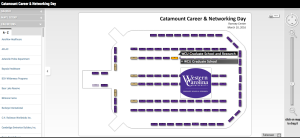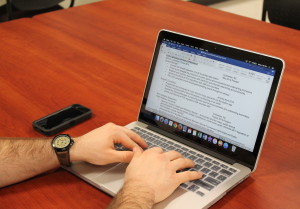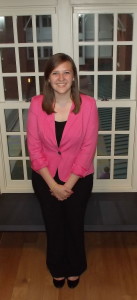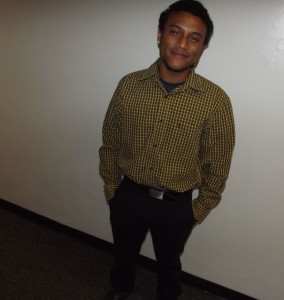This story was co-written with Meghan O’Sullivan
In a previous story, WCJ discussed Western Carolina University’s upcoming Catamount Career and Networking Day on March 10. Now, we want to give students some advice on how to prepare and succeed when meeting potential employers.
Know where you’re going

A screenshot of the interactive map shows what happens when you mouse over one of the table icons.
WCU’s Center for Career and Professional Development is offering an interactive map of the setup in Ramsey Center where people can locate attending businesses.
Sean Woodbury and Shanna Leath are two of six peer career mentors who, according to their website, offer students resume or cover letter assistance, help with interview skills and preparation, or answer career questions.
In a recent interview with WCJ, they discussed the importance of doing research about potential employers before attending the career fair.
“Know who will be there and write down any questions you may have,” said Woodbury.
Woodbury explained that the interactive map is an excellent way to know who to expect and where to find them.
Know what to bring

WCU student, Bradley Lucore, working on his resume. Photo by Haley Smith.
Students who attend the career fair should be prepared to greet potential employers with more than just questions – they
should also have copies of their resume to help promote themselves.
“Don’t use templates for your resume,” said Leath. “That’s something that is easily spotted.”
Leath encouraged students to come by Career Services for help with resumes.
Career Services also offers some resume tips on their website.
Know what to wear

Student Katie Endsley poses in professional attire. Photo taken by Meghan O’Sullivan.
“Dress and act as professional as possible,” said Leath. “Maintain eye contact and give a firm handshake.”
Students should dress professional, in order to make a good impression on any potential employers.
For women, professional dress may include slacks, skirts and dresses. Blazers and blouses are also appropriate. Clothing should not be too revealing.
For men, suits, dress shirts and slacks may all be considered appropriate.
Clothing items such as t-shirts, hats, flip-flops, jeans and sweats should be avoided for all genders.

Student Terrell Kimber poses in professional attire. Photo taken by Meghan O’Sullivan.


